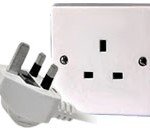 PACK LIGHT: in three ways - weight, color and volume. Mosquitos are attracted to heat and darker colored clothing produces heat and is easier seen by the insects, so it makes sense to wear lighter colored clothing as well as lighter weight fabric to keep cooler since sweat also attracts mosquitos. Plan your wardrobe with that in mind and remember that he who brings less, enjoys more with fewer bags to worry about. (Click HERE to read about colors & mosquitos) 1. Light slacks and long shorts with short sleeved shirts that are easily laundered will be best as it will be hot and you will wear bug spray and sweat, so plan to wash your clothes. The lodges all have reasonably priced laundry service or you can bring a clothes line (click to see one I bought on Amazon) to hang your clothes on overnight. Since this is a dry heat, things do dry overnight. 2. A lightweight jacket or sweater for the evenings. Sometimes it may become a bit cooler in the evenings and of course you'll need that for the plane. 3. Bring comfortable shoes, but know what we won't be doing a lot of walking so even comfortable sandals are OK. But at least one pair of sneakers is a good idea. 4. A swimsuit if you want to swim at the lodges as there is at least one pool, possibly more along the way and it will be very inviting after a day's safari drive. 5. Church clothes: Dresses for women at church, but not required in the evenings. Ties are not required for men in the evenings but it's a good idea to wear one for the church service on Sunday. Maybe plan to leave it for the members? 6. At least one hat 7. Sunglasses 8. Sunscreen 9. Strong insect repellent - Deet is recommended. 10.Binoculars Want to make the most of your safari in Tanzania? Bring a pair of binoculars! They’re fantastic for spotting wildlife lurking in the tall grasses, or birds flitting in the trees, and they’re sure to take your wildlife viewing experience to the next level. 11. A small medical kit. You should bring items like pain killers, antiseptic ointment, band aids, hand sanitizer, electrolyte tablets, eye drops, cold meds, etc. 12. Personal medications: you’ll need to consult your doctor before your trip for health advice, such as vaccinations and taking malaria prophylaxis. Be sure to take these in your carry on - never check these as the risk of losing them isn't worth it. 13. Water Bottle: we find carrying our own water bottles on the plane helps us drink more water and stay hydrated - very important in minimizing jet lag and a key to staying healthy in travel. Stewardesses often will fill our water bottles with water but beware that ice on the plane is not always safe. There are often water filling stations in airports these days as well, just remember that you can't take water through security. It will be important to stay hydrated on the safari as well. 14.Toiletries: everyone requires different toiletries, so this packing item is up to you. Earplugs and eye masks can also be fantastic when sleeping in a new environment. And don’t forget to bring some hand wipes, tissues and toilet paper. You never know when it will come in handy. 15. Nasal spray I use xclear nasal spray or a simple saline solution as preventative care since virus' grow in the nose and travel exposes us to more virus's as well as the dry air of the airline cabin. 16. Zip lock plastic bags A strange but helpful item that somehow always comes in handy and takes no space to speak of. I can't even tell you what I've used these for, but I always take a variety of sizes and find different ways to use them. Of course the most obvious use is to carry any lotions, shampoos, toothpaste, etc. in your carry-on luggage. Here's a link to a site where you can refresh yourself on the TSA rules for liquids (seems they are always changing) (https://www.wikihow.com/Pack-Liquid-and-Gels-on-a-Plane) 17. Day bag You’ll need a daypack to carry everything you need including sunscreen, a water bottle, handbook and your phone/camera. Bring a bag that’s lightweight to keep with you on the drives. 18. Snacks snacks like breakfast bars, trail mix, chocolate bars, that can be packed in day packs or pocketed are a good idea to have with you in airports and on game drives when you may get hungry between meals, especially if you have blood sugar concerns.  19. Electric adaptor & converter. You can't use your electric appliances in Tanzania without a voltage converter, because the standard voltage in Tanzania (220 V) is higher than in the United States (120 V). The adaptor to bring is the G type as found in England and much of Europe. This has two flat parallel pins and a grounding pin. If you're bringing a laptop computer it has its own built in converter but all other appliances require a converter. (Click here to see a converter with adaptor that is reasonably priced with phone charging ports). 20.Cash & Cards Most of your expenses will already be covered including your accommodation, transport and all meals. However, there are a few things you’ll need cash for like souvenirs and tips. It’s best to come prepared with a mix of credit or debit cards and cash on your Tanzania packing list.
0 Comments
Leave a Reply. |
Details
AuthorElizabeth Stoddard Archives
January 2024
|
 RSS Feed
RSS Feed